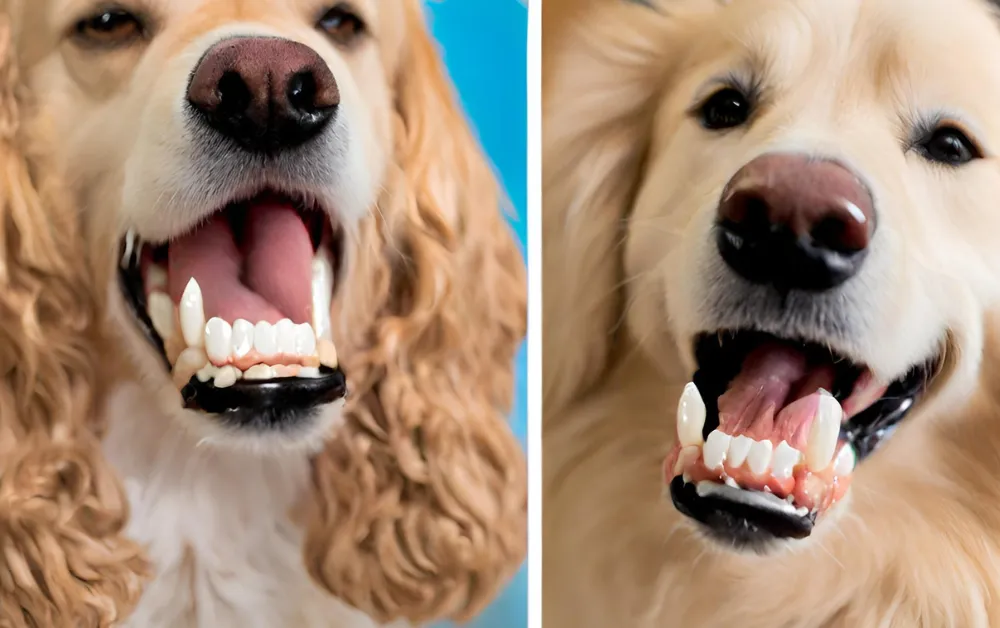Dogs do get new canine teeth as part of their normal dental development process. Dogs, like humans, go through various stages of teeth development as they grow.
One of these stages involves the growth and replacement of their canine teeth. Canine teeth, also known as “fangs,” are the long and pointed teeth that dogs use for gripping and tearing food. Just like baby teeth in humans, dogs have deciduous teeth that fall out to make way for permanent teeth.
This process typically begins when puppies are around three to four months old and continues until they are about seven months old. During this time, the puppy’s baby canines are gradually replaced by their permanent canines. Understanding the growth of canine teeth in dogs is essential for their dental health and overall well-being.
Understanding The Basics Of Canine Teeth In Dogs

Understanding the basics of canine teeth in dogs is crucial for pet owners. Canine teeth, also known as fangs, are the long, pointed teeth found in a dog’s mouth. They serve various functions such as tearing and gripping food, defending themselves, and communicating with other dogs.
These teeth are located at the front of the mouth and are usually larger and sharper than the other teeth. Canine teeth play a vital role in a dog’s overall oral health and are important for their overall well-being. By knowing about canine teeth, owners can ensure the proper care and hygiene of their dog’s teeth, leading to a happy and healthy pet.
So, it is essential to understand the significance of canine teeth in dogs.
The Lifespan Of Canine Teeth In Dogs
Dogs undergo the process of replacing their puppy teeth with adult canine teeth as they grow. The growth and development of canine teeth in puppies is an essential part of their overall dental development. It is common for dogs to start losing their puppy teeth around the age of four to six months.
The timing of tooth replacement can vary depending on factors such as breed, genetics, and overall dental health. As the adult teeth start to emerge, they push out the puppy teeth, causing them to fall out naturally. This process helps dogs develop a stronger set of teeth that are better suited for their adult needs.
Keeping an eye on your dog’s dental health is crucial during this period to ensure a smooth transition and proper oral hygiene for them.
Debunking The Myth: Can Dogs Grow New Canine Teeth?
Dogs cannot grow new canine teeth once their permanent teeth have fully developed. Unlike humans, dogs do not experience a second set of teeth. Canine puppies have baby teeth that eventually fall out to make room for their permanent teeth.
This transition occurs between the ages of three and seven months. Once the adult teeth are fully grown in, dogs do not have the capability to regenerate or grow new canine teeth. It is important to recognize the differences between baby teeth and permanent teeth in dogs to understand why they do not grow new teeth.
While dogs may experience dental issues, such as tooth loss or decay, these conditions cannot be resolved by the growth of new canine teeth. Veterinary care and regular dental hygiene practices are crucial to maintaining a dog’s oral health.
Proper Dental Care For Canine Teeth In Dogs
Dogs, just like humans, go through a teething process where their baby teeth are gradually replaced by new adult teeth. Proper dental care is crucial for their overall health. Regular veterinary check-ups and dental cleanings are key to ensuring that your dog’s teeth are in good condition.
Dental health plays a significant role in their overall well-being. Brushing your dog’s teeth regularly, providing dental chews and toys, and feeding them a balanced diet can help maintain healthy canine teeth. Professional dental care, including scaling, polishing, and extractions if necessary, should be done by a veterinarian.
Taking care of your dog’s dental health can prevent dental diseases, gum infections, and other oral problems. By prioritizing their dental care, you can keep your furry friend happy and healthy for years to come.
Common Dental Problems In Dogs And Their Impact On Canine Teeth
Dogs, like humans, are prone to dental problems that can impact their canine teeth. Dental diseases and conditions can affect dogs in various ways, causing pain and discomfort. Early detection and treatment of these issues are crucial to maintain the health of their canine teeth.
Neglecting dental problems can lead to complications such as tooth decay, gum disease, and even tooth loss. Regular dental care, including brushing their teeth and regular veterinary check-ups, can prevent or address these issues. Paying attention to their oral health can ensure that dogs have strong and healthy teeth throughout their lives.
By doing so, we can help our furry friends to live a comfortable and pain-free life. So, make sure to keep an eye out for any signs of dental problems in your beloved dogs and seek proper treatment promptly.
Conclusion
In the natural growth process of dogs, they do indeed get new canine teeth. As puppies, dogs have a set of temporary teeth, also known as baby teeth or milk teeth. These eventually fall out to make room for their permanent teeth, which consist of incisors, canines, premolars, and molars.
The growth of new teeth is critical for a dog’s oral health and overall well-being. It allows them to chew and eat properly, aiding in digestion and maintaining healthy gums. Pet owners should be aware of the typical timeline for tooth development and follow good dental hygiene practices to ensure their furry companions’ teeth are well taken care of throughout their lives.
Regular veterinary check-ups, professional cleanings, and a balanced diet all contribute to keeping dogs’ teeth healthy and promoting their long-term oral health. Remember, taking care of their teeth means taking care of their overall health. So, make sure to prioritize your dog’s dental care routine to keep those pearly whites shining!
